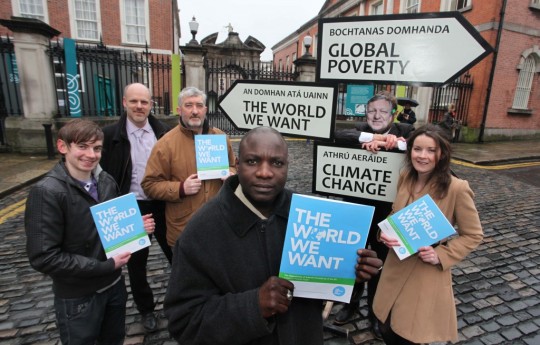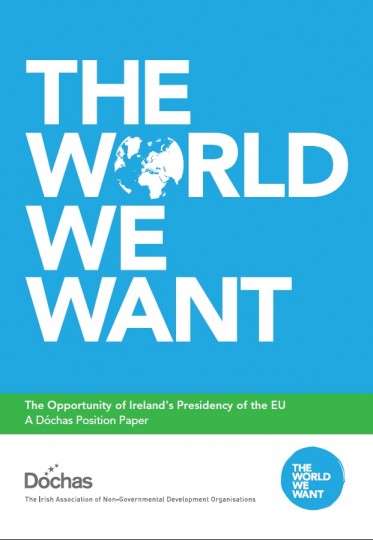The Irish Presidency of the European Council is well underway – but what does this mean for the development agenda and development education? Siobhán Sleeman investigates the opportunities for young people and the public to participate in building the post-Millennium Development Goals framework.

Last week, The Irish Presidency hosted an Informal Meeting of EU Development Ministers in Dublin Castle, creating a space for discussion on major development and humanitarian issues by EU Development Ministers. This meeting was particularly important, as in September 2013 a UN Summit will take place to review the Millennium Development Goals (MDGs), and further discuss a post-2015 development framework.
Discussions on a long-term budget for the EU are also underway in the European Parliament, giving Ireland a key opportunity to take a leadership role in facilitating discussion and decision-making that will advance the EU’s commitment to international solidarity and development and protect the world’s most vulnerable, even in a time of economic crisis.
The MDGs global initiative has resulted in some major achievements to date, including extreme poverty falling in every region; halving the proportion of people without access to improved sources of water (that’s over two billion more people with access!); and achieving parity in primary education between girls and boys (2012 MDG Progress Report).
However, 1.4 billion people still live in extreme poverty. Every 4 seconds a child dies from preventable causes and over 900 million people, particularly women and young people, suffer from chronic hunger. Climate change is also having a major impact on the lives of people around the world and threatens to undermine much of the progress made. This is why it is so important that a new international commitment is secured post-2015, to ensure the global resources we have available are used to end extreme poverty and support a sustainable future for all, as exemplified in the 2011 Human Development Report titled Sustainability and Equity – A Better Future for All.
The World We Want Manifesto
Dóchas, the umbrella body for Development NGOs in Ireland,  launched a position paper called The World We Want: the Opportunity of Ireland’s Presidency of the EU to coincide with the Ministerial meeting in Dublin. It recognises some of the short-comings associated with the MDGs and highlights six areas that could improve outcomes for all. For example, the value of embedding a human rights based approach and integrating principles of equity and sustainable development within any future development framework is strongly emphasised. At its core, it must be within a political economy that shows greater respect for future generations and the planet.
launched a position paper called The World We Want: the Opportunity of Ireland’s Presidency of the EU to coincide with the Ministerial meeting in Dublin. It recognises some of the short-comings associated with the MDGs and highlights six areas that could improve outcomes for all. For example, the value of embedding a human rights based approach and integrating principles of equity and sustainable development within any future development framework is strongly emphasised. At its core, it must be within a political economy that shows greater respect for future generations and the planet.
Another critical ingredient is the participation by global civil society ‘as a vital and independent development actor’ in shaping the new global development framework – the lack of broad consultation in developing the MDGs has been viewed as one of their key weaknesses and this must be redressed to create spaces for conversations on the kind of world we want for today’s and future generations. The emotional words of a delegate from the Phillippines at the Doha Climate Change Conference late last year illustrate this need:
“The outcome of our work is not about what our political masters want. It is about what is demanded of us by 7 billion people. Please – no more delays, no more excuses…Let 2012 be remembered as the year when we found the courage to take responsibility for the future we want.”
Although 2012 has now come to a close, we still have a significant opportunity in the coming months to influence the debate and seek a new and ambitious framework that will better address the structural causes of poverty and inequality, at home and overseas. A key result from the Rio+20 conference in 2012 was the decision to elaborate sustainable development goals (SDGs). Simon Holberg Olsen of the Institute for Global Environmental Strategies noted that the SDGs
“provide an opportunity to incorporate lessons from the Millennium Development Goals, devising a set of new goals that encompass both development and environment. Sustainable development requires the two concerns to go hand in hand, and comprehensive goals with environmental, social and economic targets will do just that.”
What’s the role for development education leading up to 2015?
Development Education has a crucial role to play in supporting people to develop a critical understanding of these many issues that are connected to one another – how we act, campaign and respond at home is as important as how development is practiced abroad so that people of all ages can become active agents of change in their local and global communities.
Development education is explicitly values-based and encourages learners – underpinned by its participatory and democratic learning methods – to question their own values and those within the society in which we live. It enables people to acknowledge their own involvement in global issues such as poverty and climate change and to take responsibility with informed action. It also, most importantly, enables them to act collectively and with NGOs to ensure their political leaders take responsibility on the global stage for promises made.
“Without an informed electorate, politicians will continue to use the bottom billion merely for photo opportunities, rather than promoting real transformation”.
Source: Paul Collier (2007), The Bottom Billion: Why the Poorest Countries Are Failing And What Can Be Done About It (Oxford University Press: UK).
So how can we participate?
The World We Want has an online page where you can add your ideas for the type of world you would like to see and also includes a blog which can keep you up to date on events that are happening in Ireland in the coming months. This site forms part of the global WorldWeWant2015.org campaign, which provides additional useful information and opportunities to get involved in the global conversation online. There are also some great resource packs available, which introduce the topic of the MDGs and post-2015 framework for use in an education setting. Examples of these are:
- Shape The Future resource pack | DFID (UK) | Junior Cycle Level/Key Stage 3| CSPE | 23 pages
- The World We Want After 2015 | UNICEF (UK) | 32 pages | young person’s guide to the MDGs, the main debates, critiques and ideas for reflecting on the post-2015 global agenda
- Youth Consultations for a Post-2015 Framework: a toolkit | Youth in Action, Restless Development and DFID Youth Working Group | non-formal youth education (EU) | 75 pages | designed to facilitate conversations with young people around the world on the subject of the post-2015 development framework
Development education is a central and immediately useful platform for people (young and old!) to build a new development framework that genuinely seeks to effect systemic change in our complex, interdependent world while recognising our different yet mutual responsibilities within that context.
Such a development framework will be owned by the people that contribute to it and are affected by it – because they have helped to shape its creation. With that in mind, join the global conversation and be a part of making the future we want for all!
The World We Want is a collaborative campaign by Dóchas along with The Wheel and Claiming Our Future. The campaign website can be found at https://worldwewant.ie
